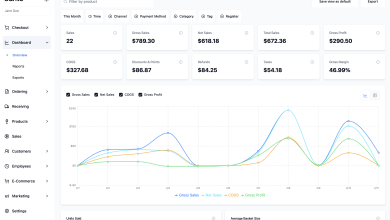
In a recent report published by Statista, 73% of retailers claimed to currently be using artificial intelligence (AI) in their operations. With this number expected to increase throughout 2024 – 15% of retail brands claim to be planning to implement AI in the next 12 months – we could soon see a significant change within the industry.
AI is designed to increase productivity, efficiency, and revenue for businesses, and the technology is having a big impact on the retail sector. We have watched in anticipation as the technology has developed over the years, and with AI now tied in with machine learning, its current capabilities are taking the world by storm. In 2023, we saw Generative AI capture the attention of consumers, and the technology’s boom over the past 12 months has accelerated adoption rates in B2B settings.
While it makes its way through several industries, AI also has the potential to play a significant role in shaping the future of retail. As advancements in AI become further sophisticated, retailers can use the technology to assist employees in a wide range of internal processes, from delivering personalized shopping experiences to streamlining supply chain operations. Its versatility allows retailers to minimize the time taken to perform tasks through automation and use the technology to scope and analyze market trends to help retailers make better decisions, faster.
Streamlining Inventory Management Using AI Tools
AI tools can help retailers streamline a number of their day-to-day operations, particularly when utilized to relieve retailers from labor-intensive processes such as inventory management.
Traditionally, inventory management practices require employees to take manual stock counts in-store, checking which items are running low and re-ordering products based on current levels. The challenge with this traditional method is that it not only takes a significant amount of time for one person to go through every individual item, but it is also prone to human error. In-store associates can take hours to count backroom stock, compromising a retailer’s ability to provide high-quality customer service during the ongoing labor shortage. Furthermore, with the risk of human error, there can be no true visibility of inventory accuracy. As such, the decisions made from manual counts become unreliable.
AI alone cannot solve this issue. However, when deployed alongside an effective inventory management technology – such as item-level RFID – retailers will not only gain real-time, accurate insight into their stock levels, but AI will leverage the data gathered to make instant stocking decisions for the retailer. When provided with data around sales, orders, and existing inventory, AI can streamline the inventory management process by making recommendations about anticipated inventory requirements.
This process can be taken another step further. Combining key market trends with customer buying behaviors also allows AI to assist retailers in long-term inventory decisions such as forecasting. Not only will AI recognize stock levels, but it will also use previous sales patterns to predict future consumer demands and react accordingly to ensure retailers are ready for any anticipated trends. This allows retailers to maintain optimal inventory levels and minimize waste. It also helps to maximize customer experiences, with accurate availability and fulfillment information shared with customers in real time.
AI’s Role in Improving Customer Experience
High-quality inventory management practices can play a significant role in enhancing the in-store customer experience. While these developments help reduce customer wait times and improve in-store service, retailers are now also enhancing their efforts through increasing personalization.
Customer Relationship Management (CRM) tools can be used to collect relevant data from customers. The technology allows retailers to gather relevant customer information such as purchase and browsing history to understand their evolving preferences and needs. Retailers can then leverage AI in tandem with their CRM platforms to create truly bespoke experiences.
While CRM on its own is already helping retailers provide in-store personalization, AI can enhance these efforts, combining context with existing consumer data. Using data collected from outside sources, such as upcoming weather predictions to wider national events, AI can expand on basic details such as name, location, and purchase history, by making assumptions about consumers’ lifestyles, analyzing their purchase patterns to gain a deeper understanding of customers, such as the preferred hobbies and sports, or whether they have children or pets. Predictive analytics can then help make accurate suggestions based on the profile the retailer has curated for each individual.
Retailers can use this information to their advantage by providing targeted offers on products their consumers buy regularly or are likely to be interested in. Exploring the latest retail and AI trends can offer insights into how technology continues to shape personalized shopping experiences and operational efficiency. Not only will this push consumers to follow through with their purchases and increase revenue, but it will also increase satisfaction levels. Providing a truly bespoke in-store experience where store associates have access to this information increases the chances of customer retention and loyalty moving forward.
Stepping into the Future
Technology has evolved the way consumers shop today. With same-day delivery and pick-up available, omnichannel fulfillment options, and real-time visibility of stock, today’s shopper is accustomed to speed and convenience.
AI only enhances a retailer’s capability to deliver this level of efficiency and seamlessness to its customers. With accurate personalization and improved fulfillment, retailers can deliver bespoke in-store experiences that exceed customer expectations. With optimized inventory practices, retailers can avoid overstocking and stockouts, and AI’s capabilities of machine learning to deliver predictive analytics help retailers gain a competitive edge within the market, increasing satisfaction, revenue, and efficiency.
Keep it Human
The possibilities with AI are endless and will likely play a significant role in the transformation of the retail industry. Retailers are acting quickly to invest in AI, with many planning to incorporate it into their operations within the next year. With the wide range of opportunities unlocked by the technology, retail operations, and customer experiences will only continue to improve.
While the potential of the technology promises a huge number of opportunities, retailers must remember that the most important service they can deliver to their customers is a human one. While technology acts as an enabler to improved processes and experiences, it should never be used to replace the human connection within retail. It should simply exist to enhance an in-store associate’s ability to deliver high-quality customer experiences that leave customers feeling valued.





